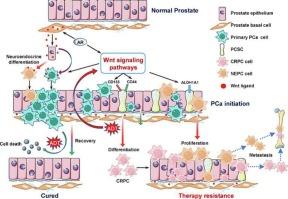Combination therapies with Wnt signaling inhibition: A better choice for prostate cancer treatment
IF 9.7
1区 医学
Q1 BIOCHEMISTRY & MOLECULAR BIOLOGY
Biochimica et biophysica acta. Reviews on cancer
Pub Date : 2024-09-25
DOI:10.1016/j.bbcan.2024.189186
引用次数: 0
Abstract
The intractability and high mortality rate of castration-resistant prostate cancer (CRPC) remain the most challenging problems in the field of prostate cancer (PCa). Emerging evidence has shown that the dysregulation of Wnt signaling pathways, which are highly conserved cascades that regulate embryonic development and maintain tissue homeostasis, is involved in various stages of PCa occurrence and progression. In this review, we systemically discuss the mechanisms by which the androgen receptor (AR) signaling pathway and Wnt signaling pathways participate in the occurrence of PCa and its progression to CRPC. Specifically, we elaborate on how Wnt signaling pathways induce the malignant transformation of prostate cells, promote the malignant progression of PCa and establish an immunosuppressive prostate tumor microenvironment through interaction with the AR pathway or in an AR-independent manner. We also discuss how Wnt signaling pathways enhances the stemness characteristics of prostate cancer stem cells (PCSCs) to induce the occurrence and metastasis of CPPC. Additionally, we discuss the latest progress in the use of different types of drugs that inhibit the Wnt signaling pathways in the treatment of PCa. We believe that the combination of Wnt signaling-based drugs with endocrine and other therapies is necessary and may enhance the clinical efficacy in the treatment of all types of PCa.

抑制 Wnt 信号的联合疗法:前列腺癌治疗的更佳选择
难治性和高死亡率仍然是前列腺癌(PCa)领域最具挑战性的问题。新的证据表明,Wnt 信号通路是高度保守的级联,可调节胚胎发育并维持组织稳态,其失调参与了 PCa 发生和发展的各个阶段。在这篇综述中,我们系统地讨论了雄激素受体(AR)信号通路和 Wnt 信号通路参与 PCa 发生和发展为 CRPC 的机制。具体而言,我们阐述了 Wnt 信号通路如何通过与 AR 信号通路相互作用或与 AR 无关的方式诱导前列腺细胞恶性转化、促进 PCa 恶性进展并建立免疫抑制性前列腺肿瘤微环境。我们还讨论了 Wnt 信号通路如何增强前列腺癌干细胞(PCSCs)的干性特征,从而诱导 CPPC 的发生和转移。此外,我们还讨论了使用不同类型的药物抑制 Wnt 信号通路治疗 PCa 的最新进展。我们认为,将基于 Wnt 信号通路的药物与内分泌疗法和其他疗法相结合是必要的,而且可以提高治疗各种类型 PCa 的临床疗效。
本文章由计算机程序翻译,如有差异,请以英文原文为准。
求助全文
约1分钟内获得全文
求助全文
来源期刊

Biochimica et biophysica acta. Reviews on cancer
医学-生化与分子生物学
CiteScore
17.20
自引率
0.00%
发文量
138
审稿时长
33 days
期刊介绍:
Biochimica et Biophysica Acta (BBA) - Reviews on Cancer encompasses the entirety of cancer biology and biochemistry, emphasizing oncogenes and tumor suppressor genes, growth-related cell cycle control signaling, carcinogenesis mechanisms, cell transformation, immunologic control mechanisms, genetics of human (mammalian) cancer, control of cell proliferation, genetic and molecular control of organismic development, rational anti-tumor drug design. It publishes mini-reviews and full reviews.
 求助内容:
求助内容: 应助结果提醒方式:
应助结果提醒方式:


